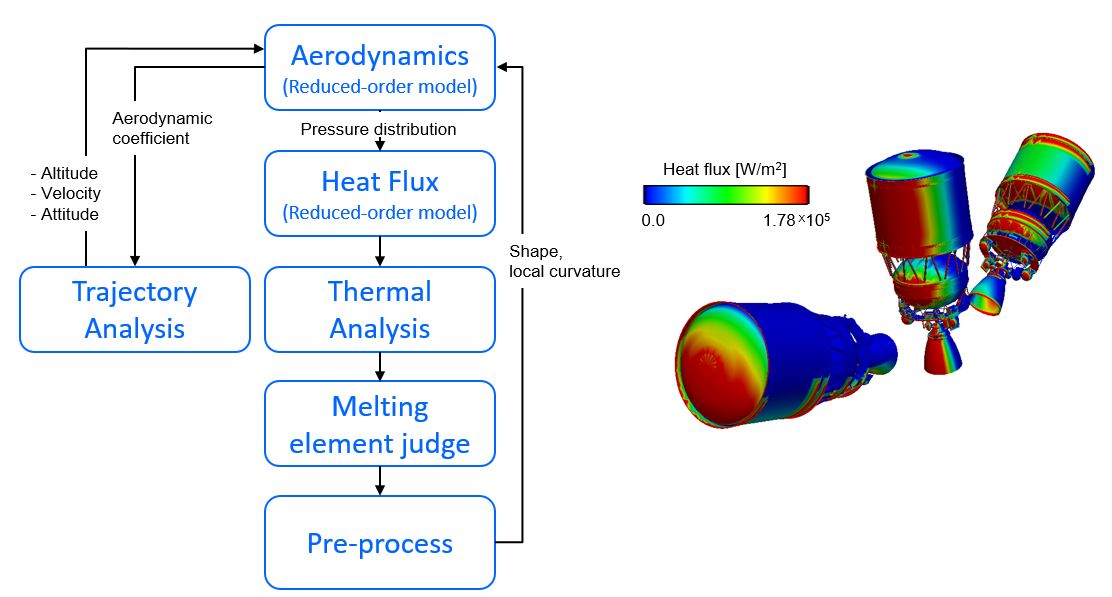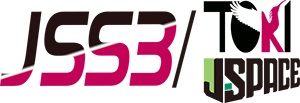Development of High-fidelity Re-entry Safety Analysis Methods
JAXA Supercomputer System Annual Report April 2018-March 2019
Report Number: R18EG3216
Subject Category: Research and Development
- Responsible Representative: Eiji Sima, Research and Development Directorate, Research Unit III
- Contact Information: Keiichiro Fujimoto(fujimoto.keiichiro@jaxa.jp)
- Members: Taisuke Nambu, Takayuki Ito, Hideyo Negishi, Yoichi Ohnishi, Miki Nishimoto, Yu Daimon, Ashvin Hosangadi, Masaaki Ino, Osamu Fukasawa, Shinji Ohno, Andrea Zambon, Takenori Nakajima, Takashi Amemiya, Yutaka Umemura, Hironori Fujiwara, Hiroumi Tani, Keiichiro Fujimoto, Tetsufumi Ohmaru, Akiko Kotani, Taroh Fukuda, Mayu Matsumoto, Masashi Toyama, Shohta Sutoh, Akimitsu Terunuma, Kota Akai
Abstract
High-fidelity re-entry safety analysis code LS-DARC is under the development in JAXA in order to realize the accurate EC predictions and the design-for-demise for the rocket upper statges and space-crafts. 6 Dof trajectory analysis, aerodynamics, heat flux, 3D thermal conductance can be considered by the coupling analysis code based on the reduced order models. Since models in LS-DARC is versatile and its turn-around time is very short, it has been applied wide range of aerospace engineering applications such as the research and development activities for the small re-entry capsule installed in HTV and the fly-back re-usable rocket.
Reference URL
N/A
Reasons for using JSS2
Probabilistic re-entry safety analysis based on the multi disciplinary coupling analysis with considering various uncertainty factors is essential. In addition consideration on the design parameter effect should also be considered. In addition, in-house computational environment is essential also for security reason. Consequently, JSS2 is essential.
Achievements of the Year
In this fiscal year, CFD analysis required to validate the heat flux and aerodynamic characteristics reduction model has been conducted for the LS-DARC development. For the integrated validation of the LS-DARC, the practical re-entry safety analysis has been conducted for the actual HIIB upper stage. As a result, accuracy improvement needs were found for the accurate EC predictions. In addition, analysis tourn-around time has been remarkably reduced, which is essential for the practical use. Schematic overview of models of LS-DARC and the example results of the surface heat flux is shown as Fig. 1.

Fig.1: Schematic overview of the multi-disciplinary high-fidelity re-entry analysis code LS-DARC, and surface heat flux distributions for HIIB upper stage
Publications
– Peer-reviewed papers
Fujimoto, K., Tani, H., Negishi, H., Saito, Y., Iizuka, N., Okita, K., Kato, A., “Uncertainty Quantification for Destructive Re-Entry Risk Analysis: JAXA Perspective,” Stardust Final Conference, Conference, Springer book, pp.283-300, 2018.
– Non peer-reviewed papers
Keiichiro Fujimoto, Hideyo Negishi, Nobuyuki Iizuka, Yasuhiro Saito, Koichi Okita,
“Quantitative Risk Analysis for Reliability and Safety issues in Aerospace Engineering,” Safety Engineering Symposium 2018, 2018.
Keiichiro Fujimoto, Hideyo Negishi, Ryo Nakamura, Yasuhide Watanabe, Toshiaki Daibo, Koichi Okita, “CFD Research Needs for Re-entry Capsule Thermo-aerodynamics and Re-entry Safety Analysis,” 32nd CFD Symposium, 2018.
Keiichiro Fujimoto, Hideyo Negishi, Toshiaki Daibo, Nobuyuki Iizuka, Ryuzo Shimizu, Koichi Okita (JAXA), “Development of High Fidelity Model-based Re-entry Safety Analysis Tool LS-DARC – Part 1,” 8th Space Debris Workshop, 2018.
Usage of JSS2
Computational Information
- Process Parallelization Methods: MPI
- Thread Parallelization Methods: FLAT並列
- Number of Processes: 96 – 512
- Elapsed Time per Case: 400 Hour(s)
Resources Used
Fraction of Usage in Total Resources*1(%): 0.27
Details
Please refer to System Configuration of JSS2 for the system configuration and major specifications of JSS2.
| System Name | Amount of Core Time(core x hours) | Fraction of Usage*2(%) |
|---|---|---|
| SORA-MA | 2,324,723.64 | 0.28 |
| SORA-PP | 106.38 | 0.00 |
| SORA-LM | 0.00 | 0.00 |
| SORA-TPP | 401.03 | 0.03 |
| File System Name | Storage Assigned(GiB) | Fraction of Usage*2(%) |
|---|---|---|
| /home | 426.01 | 0.44 |
| /data | 25,939.49 | 0.46 |
| /ltmp | 15,598.34 | 1.34 |
| Archiver Name | Storage Used(TiB) | Fraction of Usage*2(%) |
|---|---|---|
| J-SPACE | 0.31 | 0.01 |
*1: Fraction of Usage in Total Resources: Weighted average of three resource types (Computing, File System, and Archiver).
*2: Fraction of Usage:Percentage of usage relative to each resource used in one year.
JAXA Supercomputer System Annual Report April 2018-March 2019


